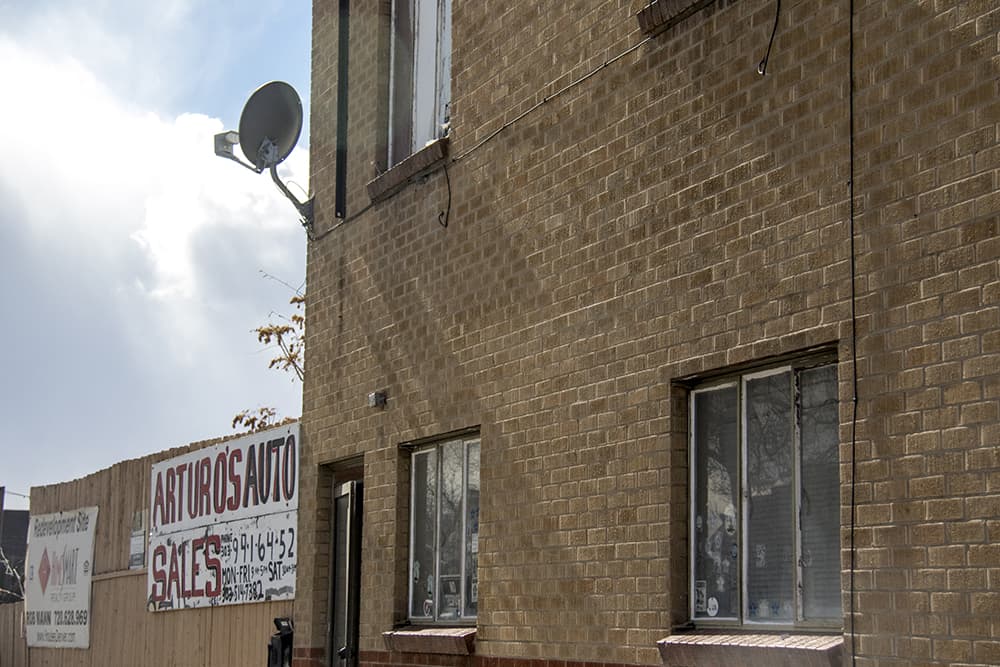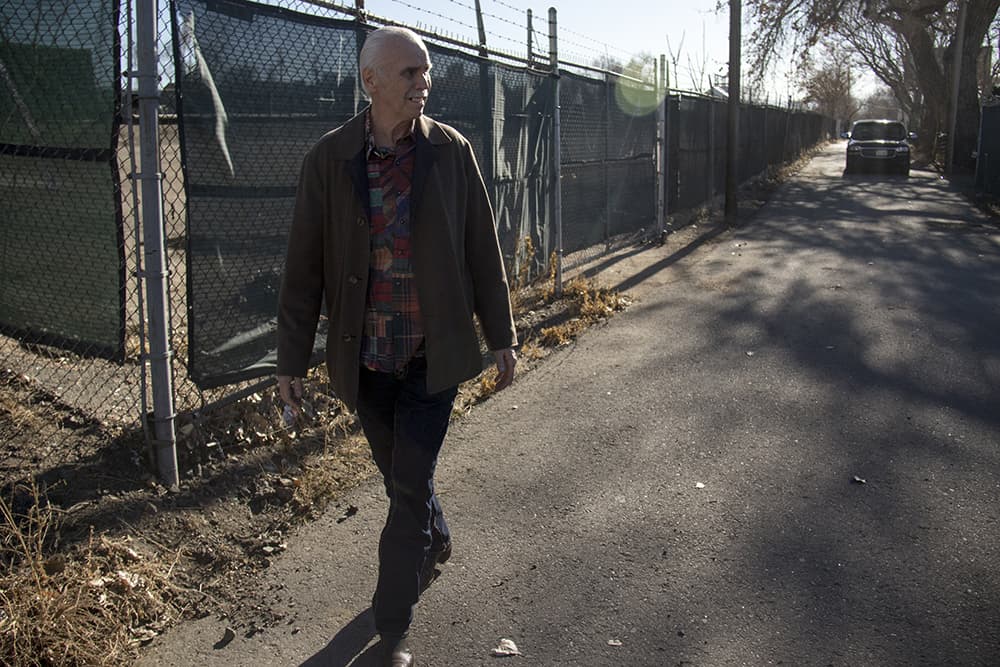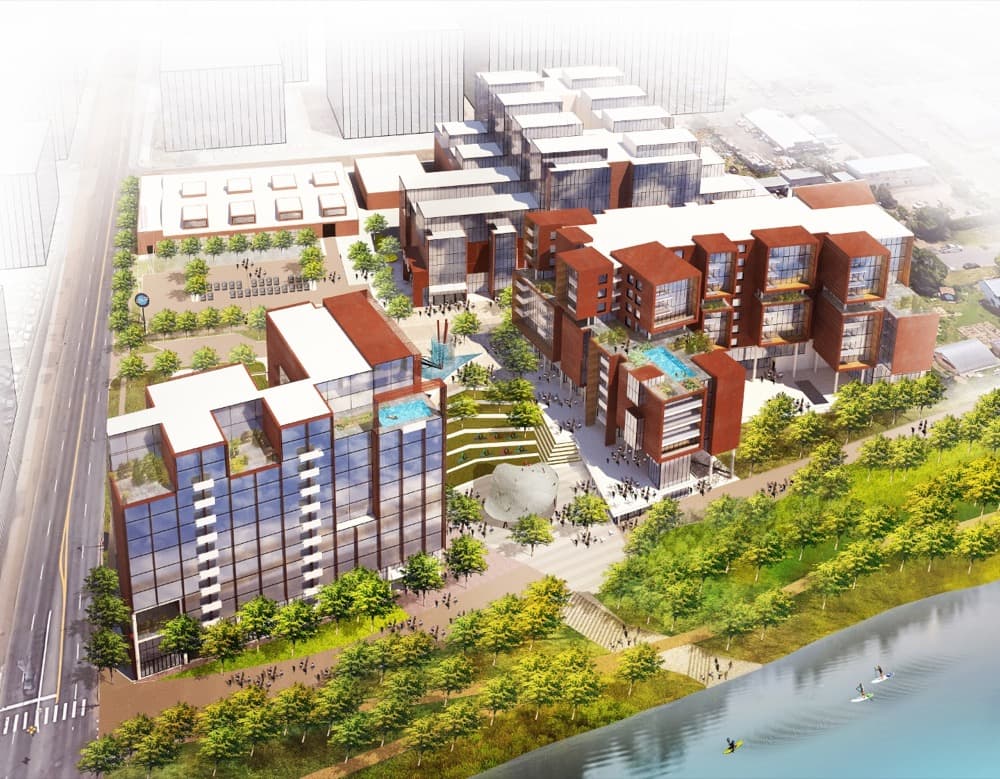
News of the progress of a $250 million project near 38th and Chestnut in Denver's River North has dredged up a loaded legal dispute over a nearby piece of property. After reading coverage in Denverite of the Hurley Place development plans, Marisol Enriquez reached out to tell us that a lawsuit filed on behalf of developer Bernard Hurley cost her family tens of thousands of dollars with no result.
"I spent over $20,000 basically defending my parents, because there was no way I was going to let him take the property from them," said Enriquez, a principal with Denver Public Schools.
Enriquez contends that Hurley's lawsuit was baseless and was meant to drive her parents to the negotiating table with a lower sales price. Attorneys for her parents, who are the property owners, made similar arguments in 2014. Hurley responds that he was only trying to protect his neighboring property from purported contamination at 3727 Delgany Street, which has long housed automotive businesses.
Wherever the truth lies, it's a textbook study of what can go wrong in RiNo, an area where small business owners stand to make millions on land sales -- but only after they deal with well-funded developers, attorneys and the pollution that blighted the place to begin with.
Enriquez's father, Ventura Nevarez, has so far declined to talk about the case. Her mother would not comment on the record. Real-estate professionals involved with the property similarly said that they wanted to stay out of it.
Enriquez further alleged that Hurley saw her parents as exploitable.
"I think that he saw an uneducated Mexican family and thought he could take advantage of them," she said. Hurley strongly denies that charge.
"I’m not a predatory person," he responded in an interview, later describing the claim as slander. "I don’t do business that way, and if you talk to anybody else I've acquired property from, that’s not how I do business."

How it started:
In April 2014, Hurley's company went under contract to purchase 3727 Delgany Street from Ventura and Rosa Nevarez, the parents of Enriquez. The contract set a purchase price of $735,000 and was signed by both parties.
Over the next months, as part of the transaction, Hurley was allowed to run environmental tests on the 0.3-acre parcel, which had been home to automotive businesses since Ventura Nevarez bought it in 1989, Enriquez said.
A company Hurley owns, Family Environmental, did the environmental testing. (He says this is typical; Enriquez questions the practice.) The assessment identified several purported environmental hazards, such as rusty barrels and the "poor storage, disposal and maintenance" of hydraulic oil, lacquer, motor oil antifreeze, paint and clear-coat.
The report also stated that there was an elevated level of lead on a downhill corner of the property.
In June 2014, Hurley's attorney sent a letter claiming that the clean-up of the Nevarez property would cost $140,000 -- and that lead and arsenic had "leeched onto the adjacent property owned by Menalto," Hurley's development company.
The lawyer's letter cited a new appraisal that put the Nevarez property's value at $380,000. The attorney offered a compromise: Menalto would take care of all the environmental issues and the property's price would be "reduced to reflect the true value ... and the effects of the contamination."
If not, Groves wrote, the developer was "prepared to file suit to protect its adjacent properties."

The Nevarez family wasn't ready to lower the price, Enriquez said.
They believed the property was worth significantly more, and they denied that they had contaminated the land. Enriquez alleges that Hurley's lawyer's letter was an unfounded attempt to push her family's sale price lower.
"Essentially, that whole area has some level of lead and contamination. My parents’ property is no different than any other in the area," Enriquez said. " ... This was their investment. They worked their whole lives to pay off the property."
Hurley says that the contamination findings demanded a lower price. Hurley said he was offering more than $380,000 but couldn't remember the exact offer. The $380,000 valuation cited in the letter works out to about $28 per square foot, compared to the $31 per square foot Hurley's company had recently paid for the neighboring Blue Moon property.
The sellers would later hire their own environmental firm, Quest, which wrote in a letter that the lead and arsenic levels -- the two materials that Menalto alleged were leaking onto its property -- were typical for the industrial area. The property is inside a federal "Superfund" site, and the Environmental Protection Agency notes that both lead and arsenic were spread across the riverfront by the smelters that once operated nearby.
"The soil and groundwater contaminants identified were present only in background concentrations assessed to be low to typical for the region," wrote Robert Woellner, president of Quest.
In an interview, Hurley contended that lead "certainly" could have come from batteries and vehicle paint at an automotive business. The only lead detected on his own property was found near the border with 3727 Delgany, he said. (Lead is not banned from automotive paints, according to the U.S. Consumer Product Safety Commision, though I've seen no evidence it ever was used at the address in question.)
As the property deal fell apart, Hurley's company sued.
On July 7, 2014, Menalto LLC filed suit against Rose and Ventura Nevarez in district court. The complaint claimed, in part, that the defendants' "intention is to sell the Delgany property to another purchaser, without disclosing or remediating the environmental contamination."
The lawsuit further claimed that the defendants might not use the money from the sale to clean the property.
"We felt like that property was a blight to the development of our property. We’d still like to buy it and clean it up," Hurley said in an interview.
He was also feeling pressure from efforts to land a big new tenant: Hurley was working to land the Blue Moon Brewery that now stands next at 38th and Delgany streets, he said.
"They were very concerned, naturally, about that property," he said. MillerCoors –– Blue Moon's parent –– also was interested in using the Nevarez family's property as part of the new brewery facility. (We've reached out to MillerCoors for comment.)
Anyway -- the lawsuit asked the court to force the defendants to pay for remediation on their property and on Hurley's.
It also demanded that the defendants be prohibited from selling the property until that work was done, or that the court at least force them to use proceeds from the sale to do the clean-up.
The Nevarez family's attorney at the time argued that this was all a negotiating tactic, not the result of legitimate environmental concerns. "The intent of the injunctive relief claim is to block any potential sale of the Delgany Property to anyone other than Menalto, Chestnut, Hurley, or any other entity owned or controlled by Hurley," one filing states.
Hurley's side responded: "The intent of the lawsuit and injunctive relief is to stop the contamination and obtain an adequate remedy for the contamination. There is no conspiracy."
Ultimately, they settled the lawsuit.
The two parties agreed to drop the lawsuit in March 2015, nine months after it began. No money was exchanged, according to both Hurley and Enriquez.
Hurley contends that he gave up only because it became clear that the cost of continuing the lawsuit was going to outweigh the cost of remediation.
Groves, the attorney, further argued in an interview that the potential property purchase was dead by the time the lawsuit started. By then, he said, the family had hired a new listing agent and doubled the price of the property.
"They made it clear they would never sell to Bernard Hurley under any circumstances. They were crystal clear on that," Groves said. With no deal on the table, he said, there was no negotiation in which to gain leverage. The lawsuit did not request that the court force the sale of the land to Hurley
To Enriquez, though, the settlement was a sign that Hurley realized he wasn't going to get the property.
"He offered to settle, I think, when he realized we weren’t going to give up," Enriquez said. The lawsuit, she said, was an attempt to tie up her family's money and resources, making a sale to Hurley more likely.
It's also worth noting that Hurley offered, through Groves, to settle the lawsuit if they sold him the property at close to the original contracted price. That last offer was for $665,000, which Groves claimed would net the Nevarez family more money than that original $735,000 contract, as they wouldn't be paying a real-estate commission. The savings, he said, would cover legal costs. Groves said that the offer was originally his idea.
The family refused. Hurley also said he offered about $1 million in 2016 and was declined. The property is currently listed on Zillow at $3,999,999.
"They want to sell, but they want to sell at a fair price," Enriquez said of her parents.
Hurley said he wishes the family "the best. I don’t have any ill feelings toward them." He has not yet remediated his own property, but says it likely will be necessary as his project proceeds.
Richard Mueller, another property owner on the block, said he too had been approached by Hurley. "He tried to buy the property at a ridiculously low price," Mueller said, but "... (H)e didn't hardball me or anything." Hurley said he has not filed any similar lawsuits, a claim supported by my review of Denver court records.
Rob Mann, the current listing agent for the Nevarez property, declined to comment on the legal dispute. He also is the agent for the Welcome Inn, another property Hurley has pursued, which now is listed at $5.1 million.
"I’m going to get the property sold," he said, "and that’s the key."
Do you know of a dispute between a developer and a landowner? Do you have questions about pollution and its impacts? Email me.












